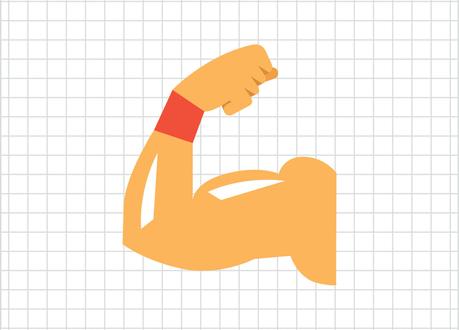
Could fasting help build muscle and unleash anti-aging properties, via the release of human growth hormone?
The physiology of fasting is fascinating. The power of fasting lies not in the mere reduction of calories, but the beneficial hormonal changes. One of the main benefits comes from reducing insulin, but there are also increases in nor-adrenalin, cortisol, and growth hormone.
Collectively, these are known as the counter-regulatory hormones, since they all serve to increase blood glucose at a time that the body is not getting glucose from food. Here we focus on human growth hormone (HGH).
Human growth hormone
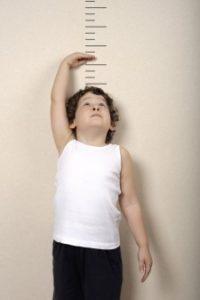
Once released by the pituitary gland, HGH only lasts a few minutes in the bloodstream. It goes to the liver for metabolism, where it is converted into a number of other growth factors, the most important of which is Insulin-Like Growth Factor 1 (IGF1).
This is the same IGF1 that is connected to high insulin levels and many poor health outcomes, but remember, that this brief pulse of IGF1 from HGH lasts a few minutes at most. All hormones are secreted naturally in very brief bursts to prevent the development of resistance, which requires both high levels and persistence of those levels (this is indeed how insulin resistance develops).
Scientists first harvested HGH from cadavers in the 1950s (eeewww), but only synthesized it in labs in the early 1980s. Soon afterwards, it became a popular performance enhancing drug. Normal levels of HGH peak in puberty (as you might expect) and gradually decrease thereafter.
Growth hormone is typically secreted during sleep and is one of the so-called counter-regulatory hormones. HGH along with cortisol and adrenalin increases blood glucose by breaking down glycogen - so it counters the effect of insulin, hence its name. These hormones are typically secreted in a pulse just before waking (4 am or so) during the 'counter-regulatory surge'. This is normal and is meant to get the body ready for the upcoming day by pushing some glucose out of storage and into the blood where it is available for energy.
When people say that you 'must' eat breakfast to have energy for the day, they are completely wrong. Your body has already given you a big shot of the good stuff and fueled you up for the day ahead. You don't need to stuff your face full of sugary cereals and toast with jam to have energy. This is also the reason why hunger is lowest first thing in the morning (8 am) even though you have not eaten for 12 hours or so.
HGH for anti-aging and building muscle
HGH typically goes down with age and abnormally low levels may lead to lower muscle and bone mass. So, what are the effects of giving HGH in older people with very low levels? This was studied in 1990 in a New England Journal of Medicine article.
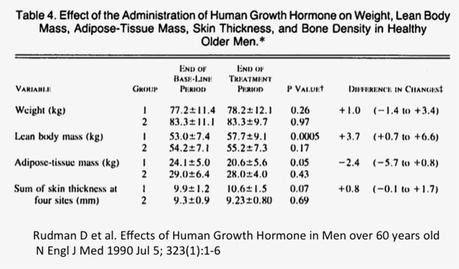
The HGH group packed on 3.7 kg (8.8%) more lean mass. That's 8 pounds of lean mass! Fat mass decreased an extra 2.4 kg (5.3 pounds)! Thats a decrease of 14.2%. Even the skin thickness improved. Whoa, nelly. Loss of fat and gain of lean mass (muscle, bone and skin). That's anti-aging, baby!
In a 2002 JAMA article, similar results were obtained in women as well. Sounds pretty great. So, why aren't we using it for everybody? Well, there's a little thing called side effects. Remember that this study only used it for people with very low HGH levels, not in people with normal levels.
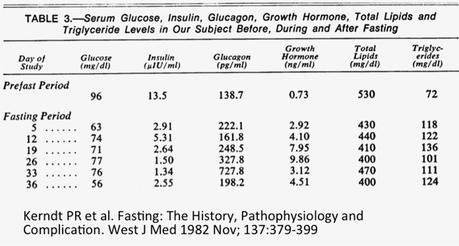
So artificial injections of HGH are out. What if there is an all-natural method of increasing growth hormone? What about, say, fasting?
Fasting to increase growth hormone
In 1982, Kerndt et al published a study of a single patient who decided to undergo a 40-day fast for religious purposes. Glucose goes down. From 96 initially, it drops to 56. Insulin goes way, way down. Starting at 13.5, it quickly drops to 2.91 and stays down. That is almost an 80% drop! If you are concerned about a disease such as type 2 diabetes, with hyperinsulinemia, nothing beats fasting to bring down those sky high insulin levels.
But our concern here is HGH. It starts at 0.73 and peaks at 9.86. That is a 1,250% increase in growth hormone. A shorter 5 day fast gives a 300% increase. All this HGH increases without drugs.
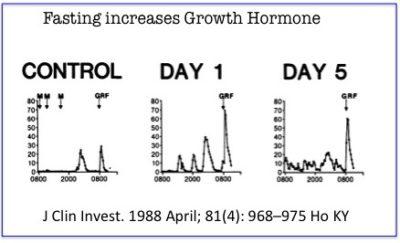
Other studies have shown the same increase in growth hormone. In 1988, Ho KY et al studied fasting and HGH. On the control day, you can see that meals (marked M) very effectively suppress HGH secretion. This is to be expected. Like cortisol, HGH increases glucose and thus is suppressed during feeding.
Fasting is a great stimulus to HGH secretion. During fasting, there is the spike in the early morning, but there is regular secretion throughout the day as well. Hartman et al also showed a 5 fold increase in HGH in response to a 2 day fast.
This HGH is crucial in the maintenance of lean mass - both muscle and bone. One of the major concerns about fasting is the loss of lean mass. Some people claim that fasting a single day causes loss of ¼ pound of muscle. Studies prove that this does not occur. In fact, the opposite can happen. In comparing caloric reduction diets to fasting, the fasting was 4 times better at preserving lean mass! Think about this for a second.
Let's imagine that we are living in Paleolithic times. During the summer of plenty, we eat lots of food and store some of that as fat on our body. Now it is winter, and there is nothing to eat. What do you suppose our body does. Should we start burning our precious muscle while preserving our stored food (fat)? Doesn't that sound pretty idiotic?
It's as if you store firewood for a wood-burning oven. You pack lots of firewood away in your storage unit. In fact, you have so much, it is spilling out all over your house and you don't even have enough room for all the wood you've stored. But when the time comes to start up the oven, you immediately chop up your sofa and throw that into the oven. Pretty stupid right? Why would we assume our body is also so stupid?
The logical thing to do is to start burning the stored wood. In the case of the body, we start to burn the stored food (fat stores) instead of burning precious muscle. Some protein is catabolized for gluconeogenesis, but the increase in HGH maintains lean mass during fasting.
Implications for athletes
This has enormous implications for athletes. This is called 'training in the fasted state'. Increased nor-adrenalin from fasting will pump you up to train harder. At the same time, the elevated HGH stimulated by fasting should increase muscle mass and make recovery from a workout easier and faster. This would be an important advantage in elite level athletes, and we are seeing more and more interest in doing this exact sort of protocol.
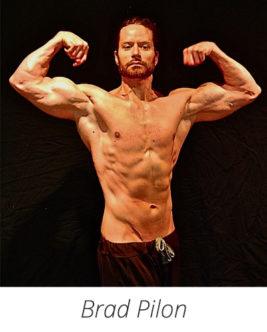
For example, Brad Pilon, who wrote the book "Eat, Stop, Eat" is a bodybuilder, as is Martin Berkhan, who popularized the 'lean gains' method of fasting. Somehow, I don't think that fasting for these two fellows was 'eating' their muscle.
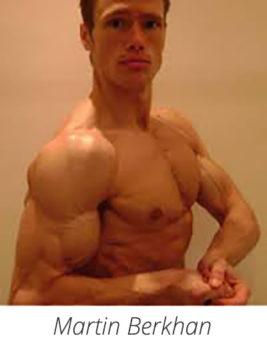
Rather, fasting has the potential to unleash the anti-aging properties of HGH without any of the problems of excessive HGH (prostate cancer, increased blood sugar, increased blood pressure). For those interested in athletic performance, the benefits are even greater.
So, let's see. Train harder. Lose weight. Faster recovery. Decrease insulin and insulin resistance. Decrease blood sugars. All of these benefits are achieved without drugs, supplements or cost. Yes, like all the best things in life, it's free. So why is everybody so against it?
-
Jason Fung

